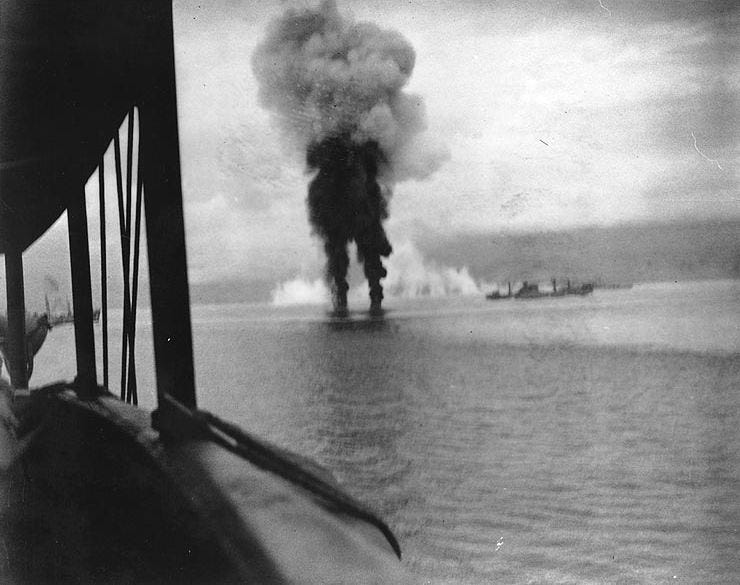TDIH: Tragedy at the Naval Battle of Guadalcanal
“We’ll see action tonight,” the captain told his men, “but we’ll get through it. We can either run or stay and fight. If we run, we lose Guadalcanal. So we’re going to stay and fight!”
On this day in 1942, the Naval Battle of Guadalcanal comes to an end. Japanese and American forces had been fighting for control of Guadalcanal and its surrounding islands for months.
Both sides especially wanted the partially finished airbase on Guadalcanal.
Naval battles on the nights of November 12-13 and November 14-15 would turn the tide decisively in Americans’ favor. Unfortunately, the conflict ended in tragedy for two sets of brothers serving aboard USS Juneau.
Five brothers from the Sullivan family and four brothers from the Rogers family were all aboard Juneau when she arrived in the Pacific. The Navy had balked at stationing brothers together, but the Sullivans and Rogers wouldn’t take “no” for an answer.
The decision was splashed across news headlines. Perhaps unsurprisingly, the brothers were soon receiving correspondence from (sometimes flirtatious) single women. Two of the Sullivan brothers, “Red” and Matt were intrigued by two particular letters—and even met the authors of those letters in person.
Would you believe both brothers were soon engaged to be married?
Nevertheless, the brothers left their sweethearts and boarded Juneau. By the end of August 1942, the ship was on its way to the Pacific. The multi-month conflict at Guadalcanal was already underway: U.S. Marines had landed on Guadalcanal and Tulagi Islands on August 7.
The battle that ensued was tough, both on land and at sea.
The brothers on Juneau were surely most worried about the naval losses. Was it safe to serve together, with so many ships beginning to litter the floor of the Pacific? The seriousness of their situation was soon highlighted by a Navy Information Bulletin, advising families to separate. The Sullivan brothers mostly ignored this advice, but the oldest Rogers sibling began to think about it.
Joey had promised his dad that he would look out for his little brothers.
Fate intervened while Juneau was docked in Nouméa, New Caledonia. Joey discovered that a nearby supply ship had training facilities for boxing. Such a situation suited him and his youngest brother, Jimmy, just fine. They could swap ships and split the family up, just as the Navy advised—and they could resume their much-loved boxing.
Pat and Louie Rogers remained behind on Juneau.
The Sullivan brothers watched the Rogers brothers split up, and they apparently began to rethink their decision to stay together. They weren’t yet ready to make a change, though. George and Frank Sullivan figured they would swap ships later.
They never got a chance.
Problems began early in November when Japanese Vice Admiral Hiroaki Abe was dispatched toward Guadalcanal. He was to lead his fleet of Japanese ships, shelling the air base and softening the area for an infantry landing.
He never made it. Instead, Abe’s fleet clashed with an American force led by American Rear Admiral Daniel Callaghan. On the night of November 12-13, Juneau was in the thick of it, fighting alongside her sister ships.
Captain Lyman Swenson was worried. In many ways, his ship wasn’t very well suited for battle. Juneau had no armor because she already carried heavy antiaircraft guns, yet she also needed speed. Nevertheless, one sailor would later remember Swenson’s parting words that evening:
“We’ll see action tonight,” the captain told his men, “but we’ll get through it. We can either run or stay and fight. If we run, we lose Guadalcanal. So we’re going to stay and fight!”
The story continues Thursday morning.
Sources can always be found on my website, here.





Thank you Tara for refreshing this story of the Sullivans. As always your history lessons reveal details that were seldom known.
What a horrible fate awaited the brothers as we know. Yet, they faced it with the certainty of doing their duty.
And, Tara Ross - you are such a vixen of literature! You keep us coming back to read more and more. I can hardly wait for tomorrow.